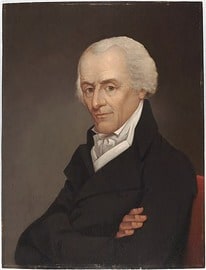Elbridge Gerry was born at Marblehead, Massachusetts, on July 17, 1744. His father emigrated to America in 1730, where he became a merchant. He lived in Marblehead until he died in 1774. His peers respected him as a man of judgment and discretion.
Young Elbridge attended Harvard College when he was fourteen. He wanted to enter the medical profession. But after leaving college, his father engaged him in the mercantile business. Within a few years, he amassed a comfortable fortune.
Provincial Representative
The town of Marblehead elected Gerry as a representative to Massachusetts province in 1772. During Gerry’s time in the government, Samuel Adams motioned to form a Standing Committee of Correspondence in 1774. This sparked the flame of patriotism throughout the province.
In response, Governor Hutchinson wrote letters to England. These letters encouraged the British administration to deal with the rebels harshly. Soon, word reached Samuel Adams about these letters, which only fanned the flames of patriotism.
Elbridge Gerry encouraged everyone to overthrow the provincial government. He united the opposition to the import taxes on tea.
In August, the House adjourned to Concord to form a Congress. The Massachusetts Congress elected fourteen members to a committee to discuss their response to the royal government. Among whom Gerry was a member, this committee published a bold appeal to organize a militia and obtain a supply of arms and ammunition.
In the spring of 1775, the prospect of war increased. They feared the Governor would try to destroy their military stores in Concord and Worcester. Their fears soon became a reality.
Fugitive
The Governor dispatched troops to arrest leaders of the revolution. He wanted to send these leaders to England to stand trial for treason. When the troops arrived in Cambridge, Gerry sent a dispatch to warn John Hancock and Samuel Adams at Lexington.
A group of British soldiers searched for Gerry and other leaders on a moonlit night. The Congressional leaders escaped their rooms and hid in the cornfields until the army passed.
After the skirmishes at Lexington and Concord, the Provincial Congress reassembled. To their dismay, they discovered that the militia did not have any store of arms or munitions. The Congress appointed Gerry as head of a committee to obtain arms and munitions. Gerry wrote his business contacts to supply the militia’s needs. In the absence of funding, Gerry advanced his own funds, much of which was never repaid.
In June 1775, the Provincial Congress met at Watertown. The night before the Battle of Bunker Hill, Dr. Joseph Warren told Gerry that he would join the militia at Bunker Hill. The morning of his departure, Dr. Warren said to Gerry: “It is sweet and glorious to lay down life for one’s country.” At Bunker Hill, Dr. Warren died fighting for liberty.
During a meeting of the Provincial Congress, Gerry proposed a law to fund armed vessels, privateers, and admiralty courts. When the law passed, Massachusetts cruisers captured many enemy vessels. The cargoes of captured ships furnished provisions for the militias.
Continental Congress
As a delegate to the Continental Congress, Massachusetts elected Gerry. Gerry took his seat on February 9, 1776. The Continental Congress appointed Gerry to serve on several committees. The tasks assigned to him were arranging a general hospital plan, introducing a better discipline into the army, examine the country’s money and finances, and speed up the settlement of public accounts.
Massachusetts summoned Gerry to a convention in 1787. The job of this convention was to revise the Articles of Confederation. Unfortunately, the Articles did not provide an adequate representation of the people. Amending the Articles would not be easy. Gerry refused to sign the Articles of Confederation.
Gerry explained: “The constitution proposed has few, if any, federal features, but is rather a system of a national government; nevertheless, in many respects, I think it has great merit, and, by proper amendments, may be adapted to ‘the exigencies of government,’ and the preservation of liberty.”
Although he opposed the Articles of Confederation, he wholeheartedly worked to carry out the Articles his country sanctioned. After his term, Gerry declined re-election and retired to Cambridge.
Ambassador
On March 4, 1797, John Adams succeeded Washington in the presidency. Adams received intelligence that the French announced its determination “not to receive another minister from the United States.” President Adams convened Congress on June 15. Upon his recommendation, Congress appointed three envoys to France. One of them was Gerry.
On their arrival at Paris, the French directory delayed acknowledging them in their official capacity. France demanded a large sum of money as the condition of negotiation. The envoys refused. France then directed two envoys to leave their territories. They invited Gerry, however, to remain and resume their talks.
Although Gerry accepted the invitation to remain, he refused to resume negotiations. He stayed in France to prevent further deterioration of relations with France. “He finally saved the peace of the nation,” said President Adams, “for he alone brought home . . . peace.”
Republican Candidate
On his return to America, in October 1798, the Republican party asked Elbridge Gerry to be their candidate for Governor. Although unsuccessful, the Republican party elected its first governor in 1805.
In 1806, Gerry retired again. But in 1810, Massachusetts appointed Gerry as chief magistrate. He served as chief magistrate for two years.
In 1812, the Republican members of Congress recommended Gerry to fill the office of Vice President. On March 4, 1813, Gerry took the oath of vice president of the United States.
The nomination of Mr. Elbridge Gerry, thus made, was followed by his election. On March 4, 1813, he was inaugurated vice president of the United States. Unfortunately, Gerry died suddenly in November 1814 at age 70.
